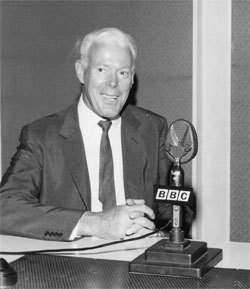Reversal into the Opposite 20 February 1984
Trevor Leggett was head of the Japanese Department of the BBC.

This is one of his broadcasts to Japan
Zubari for 20 February 1984
Hello listeners. Today I am going to say something about Reversal into the Opposite. That’s a strange title for a talk, isn’t it? To “reverse into the opposite” is surely something that happens very rarely in life – so people think.
But that is not necessarily true. We do not often get sudden reversals into the opposite: perhaps the main examples are religious conversions, when a villain repents. Most lives are not like that. But it can happen that gradually we change direction a little bit, and then a little more, and finally we end up travelling in just the opposite direction from the beginning. And sometimes we do not realize it.
A great example in British social history was some of the British schools. The purpose of a school is mainly to study. But children cannot learn to study unless they are disciplined, and also healthy. So, to make children disciplined and healthy, compulsory sport was introduced into the schools. In order to make the children enthusiastic about sports, competitive events were organized with other schools. Then a strong ‘school spirit’ was encouraged. It was just like the Japanese Ikkō and Rokkō spirit – they used to call it Tōkon when I was in Japan early in Shōwa. We, in England, did not call it Tōkon or fighting spirit – but we called it ‘school spirit’, and it was the same thing, though not quite so fierce perhaps. I used to think that the Japanese High School boys really thought of the other High Schools as enemies.
Well, in the English schools we encouraged sport to make the children disciplined and healthy, and encouraged the ‘school spirit’ in sports. But finally, some of the schools began to sacrifice the study periods so that some of the boys could train harder at the competitive sports. So, the whole purpose of the school was changed.
It had begun as a place to study. Then sport was introduced to help study. But, finally, study was sacrificed to sports.
Therefore, some of the schools had ‘reversed into the opposite’. When school heads realized what was happening, they tried to reverse again, and put more emphasis on study. But, in some schools, it was not so easy to do this – a tradition had been created of Sports First, Study Second.
A Japanese example of reversal into the opposite: a Buddhist preacher always told his pupils not to take notes. He did not explain why, and they were too frightened of him to ask him. So, one day at a sermon when outsiders were invited, they gave one of the outsiders a pencil and notebook as he went in to the sermon. They said nothing to him, but thought he would probably take some notes; then perhaps the preacher would explain why he did not want notes taken.
They were right. The outsider took a note and the preacher stopped and said, “Please don’t take notes. Listen with full attention NOW. Don’t think you can take notes now and read them up at home and get a Buddhist ‘satori’ realization at home. That is like wrapping up a dish in a restaurant and taking it home and warming it up again in the oven. But you should eat it NOW, in the restaurant.”
The pupils all thought this was a wonderful teaching. One of them repeated it to me. And he said, “Those were his words. I learnt them by heart.”
“How could you learn them by heart?” I asked.
“Oh,” he replied, “we knew that this wonderful teaching would never be repeated. So, one of us hid behind a pillar, and wrote down what he said. Then we learnt it by heart from the script!”
They had learnt by heart, from the notes, the teaching which told them not to take notes. They had gone into reverse.
When I tell this to Englishmen, they tend to say, “How Japanese!”’ Then I remind them of the English school sports, and say, “Don’t we do this too?” They look thoughtful, and then say, “Yes, I suppose we do.”
© Trevor Leggett